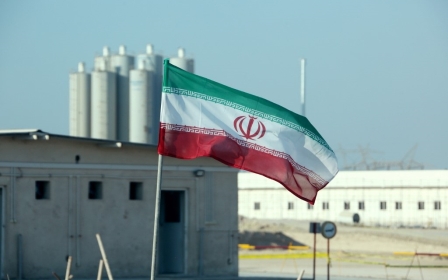Iran has capacity to enrich uranium at any percentage, nuclear agency says

Iran has the capacity to enrich uranium at any percentage if Iranian authorities decide to do so, the deputy head of the country's nuclear agency said in a report posted on its website on Saturday.
"At the moment, if authorities make the decision, the Atomic Energy Organization, as the executor, will be able to enrich uranium at any percentage," Ali Asghar Zarean said, as quoted by Reuters.
Iran said earlier this month it would scrap limitations on enriching uranium, taking a further step back from commitments to a 2015 nuclear deal with six major powers, but pledged to continue cooperating with the UN nuclear watchdog.
Since Iran took the latest step in reducing commitments to the accord, the country's stock of uranium produced has passed 1,200 kilograms (2,646 pounds) and it will quickly be added to the stock of enriched uranium, Zarean said.
Washington withdrew from the nuclear deal in 2018 and reimposed sanctions to throttle Iran's oil exports as part of a "maximum pressure" policy.
The United States says it aims to force Tehran to agree to a broader deal that puts stricter limits on its nuclear work, curbs a ballistic missile programme and ends regional proxy wars. Iran says it will not negotiate while sanctions remain in place.
Tehran has steadily been reducing its compliance with the deal, which prompted Britain, France and Germany to formally accuse it in mid-January of violating the terms and activating a dispute mechanism in the deal, which may eventually lead to the reimposition of UN sanctions.
This could have shortened the deal's lifespan, but Josep Borrell, the EU's diplomatic chief, who is tasked with convening meetings under the dispute mechanism, has called new talks, AFP reported.
Borrell said he had consulted the countries still in the deal, which also include Russia and China, and that all are determined to save the accord.
"Notwithstanding differences on modalities, there is agreement that more time is needed due to the complexity of the issues involved. The timeline is therefore extended," Borrell said in a statement on Friday.
Israeli army Chief of Staff Aviv Kochavi said earlier this month that even once Iran had enough enriched uranium, it would take its nuclear scientists another year before they could actually fire or deliver a nuclear weapon, according to the Jerusalem Post.
In Kochavi’s terms, Iranian breakout is still about two years away.
Iran denies any intent to acquire nuclear weapons and says its breaches of the deal would be reversed if Washington lifted sanctions.
Middle East Eye delivers independent and unrivalled coverage and analysis of the Middle East, North Africa and beyond. To learn more about republishing this content and the associated fees, please fill out this form. More about MEE can be found here.





